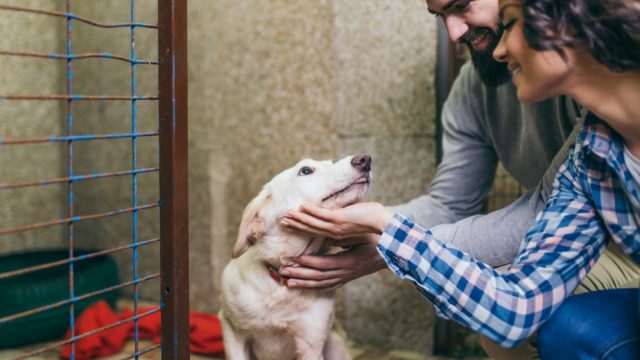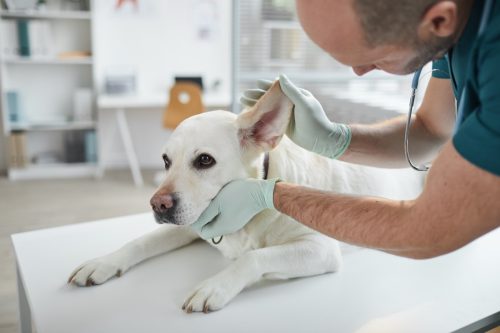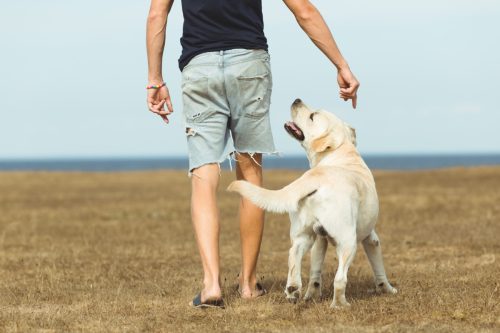6 Questions to Always Ask When Adopting a Dog, According to Vets
Getting the answers to these questions helps ensure you'll find the right dog for your lifestyle.

It's incredibly rewarding to have a four-legged best friend, and adoption is a great way to help a dog in need find a home. But taking on a dog is also a big responsibility, and in order to find your perfect match, you'll need some additional information.
"There are a few essential questions you need to ask a rescue or shelter before committing to getting a dog since, at the end of the day, adopting a dog is a pretty big deal," Sabrina Kong, DVM at WeLoveDoodles, tells Best Life. "You need to know you're 100 percent ready and have all the necessary things to take good care of a new fur baby."
There's no limit to how many questions you can ask, and in fact, Linda Simon, MVB, MRCVS, consulting veterinarian for FiveBarks, recommends asking as many as you need to. Adoption counselors are generally willing and ready to provide you with the necessary information, and if a shelter or re-homer doesn't want to address your questions, it's actually a red flag, she says.
Reputable animal shelters want to make sure they're sending each dog home with the right owner, so coming prepared with a list of questions can make the adoption process that much simpler. Read on to find out what Kong, Simon, and their fellow veterinarians say you must ask before adopting a dog.
READ THIS NEXT: The 7 Best Dogs for Beginners, Vets Say.
1
"Have any behavioral evaluations been done?"

Just like with friends and other people, we want to get along with our dogs. And just like people, dogs have unique personalities and behavioral tendencies that you'll want to be familiar with.
"A dog's personality will tell you right away if they will get along with you, your family, or other pets you might have," Alex Crow, veterinarian with HappiestDog, explains. "Always ask the shelter what their temperament is like, and try to visit the dog a few times before making a decision [so you can] get a good idea yourself."
According to Georgina Ushi Phillips, DVM, advising veterinarian and writer for NotABully.org, shelters will also often administer a formal behavioral assessment, such as SAFER, Match-Up II, Assess-a-Pet, or a custom test.
"You can call ahead to the shelters you plan on visiting and find out if they're using one of these programs and then familiarize yourself with it before visiting," Phillips says. "While there are some differences, the goal of these programs is to test a dog's reaction in a variety of situations."
2
"Has this dog been around children?"

Some dogs are wary of unfamiliar people, and if a dog hasn't been exposed to children, they can be afraid when encountering them for the first time. As such, Phillips recommends that you ask the shelter directly about how a dog interacts with kids.
"Even if you don't have children or plan on having them, this question is key for understanding how your dog will function in the world," she explains. "Children can be unpredictable and having as much information about how your dog will interact with them before an interaction occurs is important."
You can also ask how the dog does around strangers and other dogs, as this will also let you know if you'll need to put in some extra work with your new pet.
"The answer to these questions will help you know if the dog needs some extra training, which of course, takes a lot of time and not everyone may be up for the challenge," Kong says.
READ THIS NEXT: 5 Low-Maintenance Dogs You Barely Need to Walk.
3
"What is their medical history?"

Asking about a dog's medical history and current status is another crucial inquiry, so be sure to ask about vaccines, allergies, and whether or not they have been neutered or spayed.
"This is especially important when the shelter is not going to fund any medical care, [as] you may be faced with some hefty medical bills down the line," Simon explains. "A dog with itchy skin, for example, may mean you need to visit the vet every few months for costly medication. Things like this should always be discussed in detail, so you know exactly what you are taking on."
You should ask the shelter for complete medical records, as well as information on who completed the dog's exams and what qualifications they hold.
"Not every exam will be completed by a veterinarian—which is OK—but you'll want to know ahead of time," Phillips explains. "Some conditions can have lifelong impacts, and it's important to know exactly what you're getting into before you adopt."
4
"Has this dog been to a foster home?"

Often, dogs will be placed with temporary caregivers, or foster parents, who provide direct care while a pup is waiting to be adopted. According to Kong, you'll want to know if the dog you're interested in has been in foster care, as former foster parents can be a good point of contact.
"Shelters may use foster parents to help a dog recover from extensive surgery, to review behavior, or simply because there isn't enough space at the shelter," Kong explains. "In many cases, you may be able to talk with the foster parent. Most are eager to talk about the animals they care for and would happily answer your specific questions!"
For more pet advice delivered straight to your inbox, sign up for our daily newsletter.
5
"What was the dog's home life before?"

Unfortunately, dogs at shelters have been surrendered for one reason or another. It's not always negative, but it's important for you to know a bit of the backstory, vets say.
"Some dogs had a normal, happy life, while others might be coming from an abusive or neglectful home," Crow tells Best Life. "It's important to know this information, as this can affect how a dog reacts in certain situations."
For example, some dogs might be surrendered if they're excessive barkers and suffer from separation anxiety, Simon says. This can be challenging if you have a busier lifestyle and spend hours away from home. Other dogs might have ended up in the shelter due to a previous owner not being able to give them enough exercise, and you'll need to ask yourself if you're able to take on that responsibility.
6
"Have they received any training?"

One of the advantages of adopting an older dog (or at least, not a puppy), is that they might have received some training, including potty training, basic commands, and socialization.
"Some dogs are older and already have a lot of training under their belt, while others might have been neglected, might not be potty trained, or know how to behave around others," Crow explains. "If they are not well trained, this means you will need to make a commitment to do it, which can take a lot of time and energy from you."
According to Crow, you need to consider your commitment levels and how much time you can realistically spend training a new dog. If you can't meet a certain dog's needs, it isn't the right fit, he says.





















